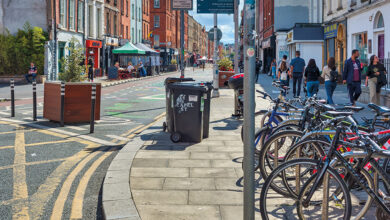Integrated, Sustainable and Accessible Mobility as a Service

Providing integrated and sustainable transport is vital for our recovery from the impact of Covid- 19, slowing climate change and maintaining strong societal cohesion, outlines Gary Sayers, Abtran’s Chief Operating Officer.
In recent years, climate change has come further to the fore of public discourse and global leaders have realised that they must take the lead to make a positive impact. Both collectively and individually, we are becoming more cognisant of our responsibilities. Significant targets have been set nationally to mitigate the impact of climate change and providing sustainable transport solutions will be fundamental to achievement of these targets.
The pandemic has brought into sharp focus the reliance we have on transport for both work and supply chains, and with populations increasing, demand for transport is expected to double globally by 2050. How Covid will impact on longer term travel trends is yet uncertain and while demand did drop in 2020 due to public health restrictions, there will shortly be a return to pre-pandemic levels of traffic and public transport usage. As the economy recovers, our sustainability targets must be central to investment, indeed it presents a platform to reimagine the future of transport and be more ambitious in realising an integrated sustainable transport outlook.
Home working is set to be a feature of the lives of travel users into the future, they will be commuting less and want direct access to more goods and services within a smaller radius. Close attention is required on how to adapt transport investment to enable more accessibility and choice for the transport user. The rate of recovery has shown to be slower for public transport than car journeys, largely for public health reasons. This poses a risk that public transport routes will be reduced and the reliance on the road network increased. Targeted stimulus packages, which include green incentives can stem any potential move away from the growth of recent years.
Initiatives such as decarbonised public transport fleets are already evident on our roads, while the competitive market for electric vehicles has meant an improvement in the range available to the consumer and the percentage of EVs on our roads is getting larger, albeit at a steady rate. Investment in fast charging infrastructure, incentivization and strong public communication are crucial to growing the electric vehicles on our roads.
With the addition of digitally integrated solutions and public and private goal alignment, the Mobility as a Service vision can be realised, bringing with it the ability to achieve climate action targets. Linking transport modes is a vital enabler to this objective. Traditional public transport will remain the cornerstone and integrated ticketing and scheduling will provide significant benefits to our society, economy, and climate.
The new concept of shared vehicle mobility has enormous potential to ease the need for private cars, in combination with a move to electric. The time is now to consider how to structure, support and grow the adoption of shared mobility and how public and private organisations can work together to deliver services which will both make transport accessible and sustainable into the future.

In his role as COO, Gary has overall responsibility for Abtran’s operational delivery including eCars customer support. He ensures that Abtran maintains service excellence through consistent, industry leading delivery solutions. Gary has over 12 years of experience in Customer Service Management in several sectors and has a primary degree in the area of Sustainable Energy Technology.
T: +353 21 2301800
E: info@abtran.com
W: www.abtran.com
Twitter: @abtranglobal






